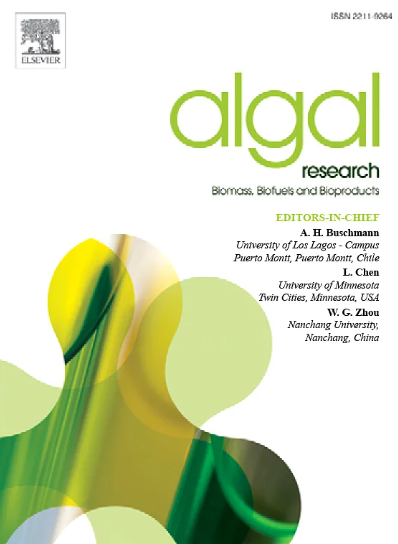Nutritional and functional assessment of fortified bread with psychrotolerant and mesophilic microalgae
IF 4.6
2区 生物学
Q1 BIOTECHNOLOGY & APPLIED MICROBIOLOGY
Algal Research-Biomass Biofuels and Bioproducts
Pub Date : 2025-01-09
DOI:10.1016/j.algal.2025.103900
引用次数: 0
Abstract
Bread is a staple food in almost every culture. However, the inadequate micronutrient profile, high glycemic index and low protein content of the gluten-free option have made it necessary to modify bread. Recently, microalgae have come to the fore in enriching the nutrient profile of bread. This study was carried out to investigate the changes in the nutrient profile of whole wheat and gluten-free bread formulations, including psychrotolerant Chlorella vulgaris ASYA27, Micractinium simplicissimum ASYA46 or a mesophilic Chlorella vulgaris ARAS102. Adding microalgae increased the ash, mineral and total protein content but decreased the moisture profile due to the water retention property of soluble proteins. Reflected by their rich nutritional profile, microalgae addition also improved the antioxidant profile, Vitamin B and amino acid composition of the bread formulation. The mesophilic C. vulgaris ARAS102 was most pronounced for its contribution to increased histidine, valine, isoleucine, phenylalanine, threonine, and Vitamin B6 levels, while psychrotolerant M. simplicissimum ASYA46 mainly improved leucine, tryptophan, and vitamin B1 levels. Psychrotolerant microalgae were more effective in increasing the fiber content, omega-3 and omega-6 fatty acid levels, and lowering the glycemic index value of the bread formulations. This study demonstrates the value of psychrotolerant microalgae as a functional ingredient and an effective tool to increase the nutritional content of bread to fill dietary gaps for sustainable food production and functional food trends.
求助全文
约1分钟内获得全文
求助全文
来源期刊

Algal Research-Biomass Biofuels and Bioproducts
BIOTECHNOLOGY & APPLIED MICROBIOLOGY-
CiteScore
9.40
自引率
7.80%
发文量
332
期刊介绍:
Algal Research is an international phycology journal covering all areas of emerging technologies in algae biology, biomass production, cultivation, harvesting, extraction, bioproducts, biorefinery, engineering, and econometrics. Algae is defined to include cyanobacteria, microalgae, and protists and symbionts of interest in biotechnology. The journal publishes original research and reviews for the following scope: algal biology, including but not exclusive to: phylogeny, biodiversity, molecular traits, metabolic regulation, and genetic engineering, algal cultivation, e.g. phototrophic systems, heterotrophic systems, and mixotrophic systems, algal harvesting and extraction systems, biotechnology to convert algal biomass and components into biofuels and bioproducts, e.g., nutraceuticals, pharmaceuticals, animal feed, plastics, etc. algal products and their economic assessment
 求助内容:
求助内容: 应助结果提醒方式:
应助结果提醒方式:


